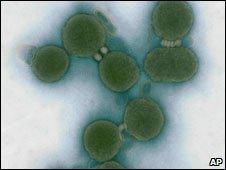Ethics concern over synthetic cell
- Published

Discussions on the ethical implications of Dr Venter's work continue
Bioethicists have reacted with caution to the announcement that scientists in the US have created the first synthetic living cell.
Dr Craig Venter's team announced their landmark discovery in Science magazine.
They have succeeded in transplanting synthetic DNA for a bacterium into a host cell.
But what are the ethical implications of their discovery?
GLENN MCGEE, FOUNDER OF AMERICAN JOURNAL OF BIOETHICS AND FRANCIS PROFESSOR IN BIOETHICS
We have now accomplished the last piece on the list that was required to do what ethicists called "playing God". What that literally means is the capacity to be a creator.
There are a number of people who will find that very fact in itself terrifying. Many believe there ought to be certain areas that ought to be left alone. This is one of those areas where you can do things vastly before you consider their implications.
There are obviously very important ethical issues. This work has proceeded without any real regulation at all. The bad guys are out there. Weaponising all sorts of things will be much, much easier.
The science is flying 30,000 feet over the public's understanding of the ethics. Scientists can be their own worst enemy by using words like "clone" or "synthetic life".
This isn't a case of rogue scientists, this is a group that is extremely well known, incredibly well respected.
You are going to have to help scientists with education so this thing doesn't become a national or international threat.
[That is] the way to fend off the Luddites that would say this and any other genetic research is awful - these people will be harder to fend off because more safeguards haven't been made.
PROF JULIAN SAVULESCU, HEAD OF OXFORD UEHIRO CENTRE FOR PRACTICAL ETHICS
A lot of people will think that the main ethical concern is that this is playing God. But the main issue for me is that this has profound and unparalleled potential benefits - developing new biofuels, being able to deal with pollution, new medical treatments - but it also has almost unimaginable potential risks.
So far we have seen [elsewhere] the construction of polio and mouse pox but these are just small fry compared to what might happen when you can go down the path of engineering organisms that could never naturally exist.
I don't think people appreciate the power of this revolution. I don't think the scientists are behaving unethically but this is potentially so powerful we have to think now how we are going to realise the benefits before exposing ourselves to the risk.
If this research goes in one direction Dr Venter may get the Nobel prize, but if it goes in another direction there will be no Nobel prizes to give because there will be no people to give them.
JOHN HAAS, PRESIDENT OF THE NATIONAL CATHOLIC BIOETHICS CENTER
They are doing significant modifications to the biological matter, but it isn't truly artificial life. Obviously when one engenders a new life form one can't be entirely certain what it's going to do, how it's going to reproduce. It could turn out to be virulent [although that's unlikely in this case].
Unesco and the UN do have bioethical oversight bodies. This does need oversight - you can unleash new lifeforms that could be quite dangerous.
We don't think you can create life. One can modify and manipulate already existing biological material. No-one [is] able to create life from scratch. There have been claims before that life has been created.
GREGORY KAEBNICK, HASTINGS INSTITUTE RESEARCH SCHOLAR
This is a lovely result. Just synthesising a genome that big is a big technical advance and undoubtedly they've learned a lot about how to insert a genome into a cell.
But I don't really see this as the huge advance that Venter is making it out to be, and I certainly don't see it as the philosophical advance that he's making it out to be.
Frankly, he's describing it in a way that's drumming up controversy more than characterising it accurately. His claim that we've got the first self-replicating life form whose parent is a computer, that's just silly.
It misuses the word "parent". The advance here needs to be described in sane and accurate ways. What he's managed to do is synthesise a genome much larger than any genome that's been synthesised from scratch before.
He said it's changed his own views of what the concept of life is and how life works. I'm really not sure why it would have done that.
LAURA HAKE, PROFESSOR OF BIOLOGY, BOSTON COLLEGE, JESUIT RESEARCH UNIVERSITY
I think that the synthetic cell that has just been created is a very exciting basic science breakthrough. I have concerns though that there will be a rush to release it into a natural environment.
There are many disturbing examples of other types of artificial constructions, like GEO crops and over-use of pesticides, that are leading to very significant problems in the balance that needs to be maintained in our ecosystem - for maintaining a healthy planet.
- Published20 May 2010